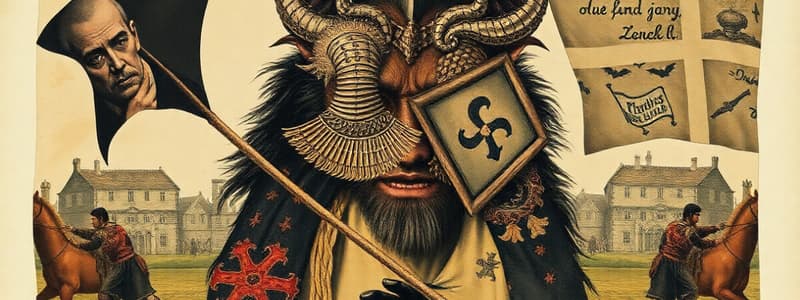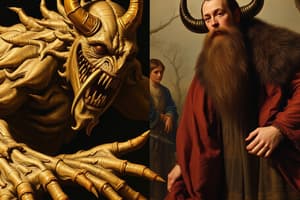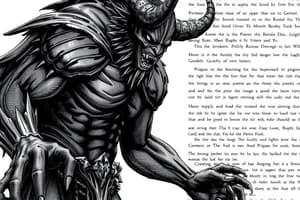Podcast
Questions and Answers
What happened to Grendel during the battle?
What happened to Grendel during the battle?
- He was mortally wounded. (correct)
- He defeated Hygelac's kinsman.
- He fled the battlefield unscathed.
- He discovered a hidden treasure.
How did Grendel feel towards human beings?
How did Grendel feel towards human beings?
- He admired them.
- He was indifferent to them.
- He felt pity for them.
- He was moved by spite against them. (correct)
What was the condition of Grendel's body after the fight?
What was the condition of Grendel's body after the fight?
- He suffered from severe injuries. (correct)
- His body was intact.
- He was revitalized.
- He was unaffected.
What did Grendel do after being wounded?
What did Grendel do after being wounded?
What is indicated about the glory of the fight?
What is indicated about the glory of the fight?
What did the Danes do after the battle?
What did the Danes do after the battle?
What did Grendel's injury involve?
What did Grendel's injury involve?
What does the phrase 'his wandering soul would flit far off to Hell' suggest?
What does the phrase 'his wandering soul would flit far off to Hell' suggest?
What year range defines the Old English (Anglo-Saxon) Period?
What year range defines the Old English (Anglo-Saxon) Period?
Which tribes were responsible for laying the foundation of the English language?
Which tribes were responsible for laying the foundation of the English language?
What significant event occurred in 410 AD?
What significant event occurred in 410 AD?
What was the Danelaw?
What was the Danelaw?
What was one major consequence of the Roman withdrawal in 410 AD?
What was one major consequence of the Roman withdrawal in 410 AD?
Why did Germanic tribes initially settle in England?
Why did Germanic tribes initially settle in England?
What significant event did the United States declare in 1776?
What significant event did the United States declare in 1776?
Which event marked the beginning of a new era of invasions in England?
Which event marked the beginning of a new era of invasions in England?
Who successfully defended against Viking invasions in 871?
Who successfully defended against Viking invasions in 871?
What served as an inspiration for the French Revolution in 1789?
What served as an inspiration for the French Revolution in 1789?
What economic change occurred during the Industrial Revolution?
What economic change occurred during the Industrial Revolution?
Which poets are credited with starting the Romantic period in 1798?
Which poets are credited with starting the Romantic period in 1798?
What was a common belief among Romantic poets regarding rational thought?
What was a common belief among Romantic poets regarding rational thought?
What social issue became apparent during the Industrial Revolution?
What social issue became apparent during the Industrial Revolution?
How did some Romantic writers use opium?
How did some Romantic writers use opium?
What was a common theme in the subjects chosen by Romantic poets?
What was a common theme in the subjects chosen by Romantic poets?
What is Corinna's significance in the poem?
What is Corinna's significance in the poem?
What imagery is used to describe Corinna's resting place?
What imagery is used to describe Corinna's resting place?
Which area is mentioned as a location in the poem?
Which area is mentioned as a location in the poem?
What action does Corinna perform as part of her evening routine?
What action does Corinna perform as part of her evening routine?
What does the phrase 'No drunken rake to pick her up' suggest about Corinna's social life?
What does the phrase 'No drunken rake to pick her up' suggest about Corinna's social life?
Which phrase suggests a sense of vulnerability in Corinna?
Which phrase suggests a sense of vulnerability in Corinna?
What does the term 'batter'd' imply about Corinna's appearance?
What does the term 'batter'd' imply about Corinna's appearance?
What does the phrase 'Takes off her artificial hair' symbolize?
What does the phrase 'Takes off her artificial hair' symbolize?
What emotion does the speaker express towards what mankind has created?
What emotion does the speaker express towards what mankind has created?
What is suggested about the birds in the speaker's observation?
What is suggested about the birds in the speaker's observation?
What does the phrase 'thrill of pleasure' likely refer to?
What does the phrase 'thrill of pleasure' likely refer to?
What does the speaker contemplate about nature?
What does the speaker contemplate about nature?
What does the speaker wish to believe regarding nature's purpose?
What does the speaker wish to believe regarding nature's purpose?
Which phrase reflects the speaker's doubt about mankind's actions?
Which phrase reflects the speaker's doubt about mankind's actions?
How does the speaker feel about the relationship between nature and humanity?
How does the speaker feel about the relationship between nature and humanity?
What is implied about the speaker's views on human experience?
What is implied about the speaker's views on human experience?
What characterized the attitude of novelists during the Victorian age?
What characterized the attitude of novelists during the Victorian age?
Which novel is considered the first children's novel?
Which novel is considered the first children's novel?
What literary element is commonly found in Charlotte Brontë's Jane Eyre?
What literary element is commonly found in Charlotte Brontë's Jane Eyre?
What was a significant change in the presentation of novels during the Victorian age?
What was a significant change in the presentation of novels during the Victorian age?
Which of the following novels was initially heavily criticized due to its main character?
Which of the following novels was initially heavily criticized due to its main character?
Who among the following is NOT one of the Brontë sisters?
Who among the following is NOT one of the Brontë sisters?
What was one characteristic of novels aimed at children before the Victorian era?
What was one characteristic of novels aimed at children before the Victorian era?
How did the role of the novel change towards the end of the Victorian age?
How did the role of the novel change towards the end of the Victorian age?
Flashcards
Who settled England in the 5th Century AD?
Who settled England in the 5th Century AD?
The Angles, Saxons, and Jutes were Germanic tribes who migrated to England during the 5th century AD, establishing the foundation of the English nation and language.
Why did the Celts ask the Germanic tribes for help?
Why did the Celts ask the Germanic tribes for help?
The Roman Empire withdrew its armies from Britain in 410 AD, leaving the Celts vulnerable to attacks from the Picts in the North.
How did the Germanic tribes change the landscape of England?
How did the Germanic tribes change the landscape of England?
The Germanic tribes gradually took over land from the Celts, pushing them to the edges of England, including Cornwall, Wales, Scotland, and Ireland.
What was the political landscape after the Germanic settlement?
What was the political landscape after the Germanic settlement?
Signup and view all the flashcards
What role did monasteries play in early England?
What role did monasteries play in early England?
Signup and view all the flashcards
What disrupted the relative peace in England?
What disrupted the relative peace in England?
Signup and view all the flashcards
How did the Vikings' presence in England evolve over time?
How did the Vikings' presence in England evolve over time?
Signup and view all the flashcards
How did Alfred the Great prevent the Danish takeover of England?
How did Alfred the Great prevent the Danish takeover of England?
Signup and view all the flashcards
Grendel's Spite
Grendel's Spite
Signup and view all the flashcards
Grendel's Failure
Grendel's Failure
Signup and view all the flashcards
Beowulf's Grip
Beowulf's Grip
Signup and view all the flashcards
Grendel's Mortal Wound
Grendel's Mortal Wound
Signup and view all the flashcards
Beowulf's Glory
Beowulf's Glory
Signup and view all the flashcards
Grendel's Retreat
Grendel's Retreat
Signup and view all the flashcards
The Danes' Rejoicing
The Danes' Rejoicing
Signup and view all the flashcards
The Bloody Battle
The Bloody Battle
Signup and view all the flashcards
What is a 'toast' in this context?
What is a 'toast' in this context?
Signup and view all the flashcards
What is Drury Lane?
What is Drury Lane?
Signup and view all the flashcards
What is Covent Garden?
What is Covent Garden?
Signup and view all the flashcards
What is 'bower'?
What is 'bower'?
Signup and view all the flashcards
What does it mean to 'sup on tick'?
What does it mean to 'sup on tick'?
Signup and view all the flashcards
What does it mean to 'drink on credit'?
What does it mean to 'drink on credit'?
Signup and view all the flashcards
What is a 'rake' in this context?
What is a 'rake' in this context?
Signup and view all the flashcards
What does 'pick her up' mean?
What does 'pick her up' mean?
Signup and view all the flashcards
When did the Romantic period start?
When did the Romantic period start?
Signup and view all the flashcards
Who is Jonathan Swift?
Who is Jonathan Swift?
Signup and view all the flashcards
What did Romantic poets value?
What did Romantic poets value?
Signup and view all the flashcards
Why were Romantic poets disappointed with the present?
Why were Romantic poets disappointed with the present?
Signup and view all the flashcards
What were the subjects of Romantic poetry?
What were the subjects of Romantic poetry?
Signup and view all the flashcards
What drug influenced some Romantic writers?
What drug influenced some Romantic writers?
Signup and view all the flashcards
How did the French Revolution influence Romantic poets?
How did the French Revolution influence Romantic poets?
Signup and view all the flashcards
What was the impact of the Industrial Revolution?
What was the impact of the Industrial Revolution?
Signup and view all the flashcards
Nature's Delight
Nature's Delight
Signup and view all the flashcards
Humanity's Suffering
Humanity's Suffering
Signup and view all the flashcards
Birds' Joyful Motion
Birds' Joyful Motion
Signup and view all the flashcards
Nature's Holy Plan
Nature's Holy Plan
Signup and view all the flashcards
Reason to Lament
Reason to Lament
Signup and view all the flashcards
Pleasure in Simplicity
Pleasure in Simplicity
Signup and view all the flashcards
Heaven-Sent Belief
Heaven-Sent Belief
Signup and view all the flashcards
Nature's Joy vs. Humanity's Pain
Nature's Joy vs. Humanity's Pain
Signup and view all the flashcards
What was a notable change in children's literature during the Victorian Age?
What was a notable change in children's literature during the Victorian Age?
Signup and view all the flashcards
Why did the novel become so popular in the Victorian Era?
Why did the novel become so popular in the Victorian Era?
Signup and view all the flashcards
What was the hallmark of Jane Austen's novels?
What was the hallmark of Jane Austen's novels?
Signup and view all the flashcards
How did Charlotte Brontë's personal experiences influence Jane Eyre?
How did Charlotte Brontë's personal experiences influence Jane Eyre?
Signup and view all the flashcards
What is the key theme of Wuthering Heights?
What is the key theme of Wuthering Heights?
Signup and view all the flashcards
Why did Wuthering Heights receive criticism upon its release?
Why did Wuthering Heights receive criticism upon its release?
Signup and view all the flashcards
What aspects of Victorian society did Victorian novelists address?
What aspects of Victorian society did Victorian novelists address?
Signup and view all the flashcards
How did Victorian novelists compare to poets?
How did Victorian novelists compare to poets?
Signup and view all the flashcards
Study Notes
A Reader of English Literature
- Vwo 5 textbook
- Contains content on different English literary periods
- Includes a glossary of important literary terms
Contents
- Old English (Anglo-Saxon) Period: c. 500-1066 (page 2)
- Middle English Period: 1066-1500 (page 2)
- Renaissance: 1500-1660 (page 2)
- Age of Reason: 1660-1800 (page 2)
- Romantic Period: 1800-1837 (page 2)
- Victorian Age: 1837-1901 (page 2)
- Glossary of important literary terms: page 33
Old English (Anglo-Saxon) Period
- History: The foundation of the English nation and language began in the 5th century AD (page 3)
- Germanic tribes (Angles, Saxons, Jutes) settled in Britain.
- Britain was part of the Roman Empire until 410 AD, when Roman armies withdrew.
- Celts, who were already in Britain prior to Romans, were largely dependent on the Roman armies for protection.
- Angles, Saxons, and Jutes were hired to protect the Celts, but eventually started settling, displacing native inhabitants (page 3).
- Nation formed with English language that is still used, formed in the process (page 3).
- The country was divided into kingdoms and was relatively peaceful for centuries (page 3).
- Celts converted Germanic tribes to Christianity.
- Norse raids by Scandinavians, known as Vikings, began in 793 CE (page 3). Vikings eventually settled in areas.
-
- Anglo-Saxons and Vikings lived together peacefully in a unified nation (page 3). Vikings converted to Christianity.
- Famous invasions by Scots, Irish, and Picts in the 4th and 5th centuries (page 3).
- King Alfred the Great prevented further Viking settlement.
Poetry
- Old English Period poetry was often anonymous and narrative.
- Poems are often epic poems about great heroes (e.g., Beowulf) in alliterative verse.
- Beowulf (c. 700) is an epic poem, a long work with heroic tales written in alliterative verse, consisting of 3182 lines.
- Beowulf was brought over to England and was written as a poem with Christian elements, originating from Scandinavian legends (page 4).
Middle English Period (1066 - 1500)
- History: Edward the Confessor became king after Danish rule.
- Feudal system: England's government was based on a hierarchical system where land ownership determines power and obligations.
- Doomsday Book: (1086) - King William ordered the creation of a book that was a record of all land holdings, property, and rights/duties (page 6)
- Normans: took over England.
- Feudal system: similar to France's
- Langauge Changes: English began to evolve, borrowing many French words.
The Renaissance (1500-1660)
- History: King Henry VIII broke with the Roman Catholic Church.
- Queen Elizabeth I: became a powerful ruler (page 11).
- Religious quarrels, economic issues, and a weak treasury plagued England.
- Puritans: extremely strict Protestants, controlled England from 1648-1660; popular measures to limit theatre, festivities, and festivities (page 11)
- Restoration: monarchy restored in 1660 (page 11)
- Renaissance scholars studied Greek and Roman cultures, which influenced art and literature.
- Humanists (e.g., Erasmus, Thomas More): influential Renaissance scholars.
- The word 'Renaissance' means 'rebirth'- a renewed interest in Greek and Roman cultures.
The Age of Reason (1660-1800)
- History: Religious conflicts reignited.
- King Charles succeeded Elizabeth I and his son King James (page 11).
- King James I & Charles I faced religious quarrels and civil wars.
- Oliver Cromwell: led a republic, the Commonwealth of England (1648-1660) (page 11).
- King George I, a distant relative of King James I, succeeded Anne.
- The power of the English parliament and the Prime Minister grew (page 11)
- Industrial Revolution: started, shifting from agricultural to industrial economies (page 19).
- A new class of wealthy merchants and shopkeepers emerged who were receptive to literature.
The Romantic Period (1800-1837)
- History: Society changed; The United States declared independence in 1776; British-based Industrial Revolution (1780s);
- French Revolution: influenced young people.
- Ideas of freedom, equality, and abolition: sparked change and spread though Europe.
Literary Works (various periods).
- Gothic Novels: Tales of mystery and terror; examples include Frankenstein by Mary Shelly, and the Castle of Otranto by Horace Walpole (Page 27).
- Novels: Like Robinson Crusoe by Daniel Defoe (Page 21) and Pamela by Samuel Richardson (Page 21).
- Poetry: Focus on nature, emotion; examples include Wordsworth and Coleridge's Lyrical Ballads (page 26) and, popular poetry from Jonathan Swift (page 35), and Shakespeare's plays (Page 15)
- Drama: Playwrights like William Shakespeare wrote comedies and tragedies; The Taming of the Shrew, A Midsummer Night's Dream, Romeo and Juliet, and Hamlet. (page 15).
Glossary of Literary Terms (page 38)
- Contains definitions of various literary devices and terms.
Studying That Suits You
Use AI to generate personalized quizzes and flashcards to suit your learning preferences.




